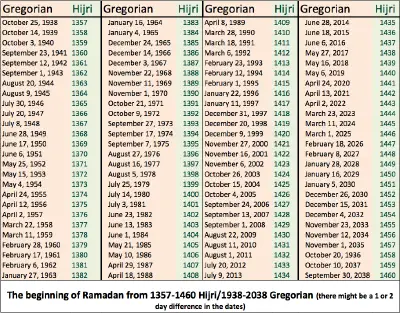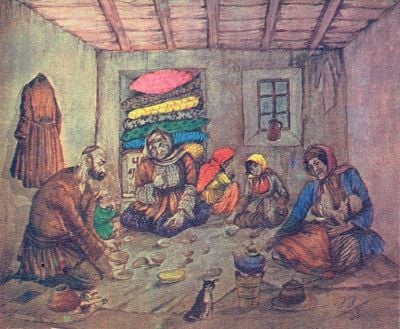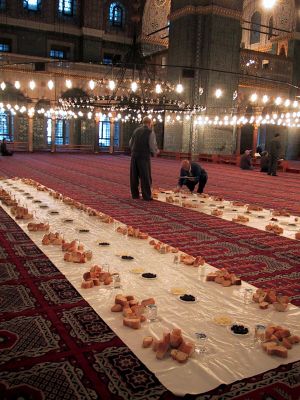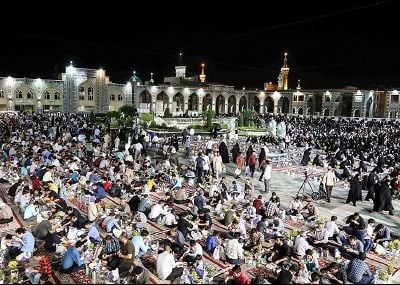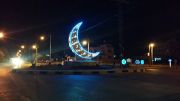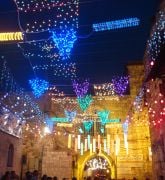Difference between revisions of "Ramadan" - New World Encyclopedia
Rosie Tanabe (talk | contribs) |
|||
| (75 intermediate revisions by one other user not shown) | |||
| Line 1: | Line 1: | ||
| − | + | {{Images OK}}{{Submitted}}{{Approved}}{{Copyedited}} | |
{{Infobox Holiday | {{Infobox Holiday | ||
| Line 16: | Line 16: | ||
|official_name = | |official_name = | ||
|observedby = [[Muslim]]s | |observedby = [[Muslim]]s | ||
| − | |begins = At the last night of [[Sha'ban|the month of Sha'ban]]<ref name=Dummies>Malcolm Clark, ''Islam For Dummies'' (John Wiley & Sons, | + | |begins = At the last night of [[Sha'ban|the month of Sha'ban]]<ref name=Dummies>Malcolm Clark, ''Islam For Dummies'' (John Wiley & Sons, 2019, ISBN 978-1119642978).</ref> |
|ends = At the last night of [[Ramadan (calendar month)|the month of Ramadan]]<ref name=Dummies/> | |ends = At the last night of [[Ramadan (calendar month)|the month of Ramadan]]<ref name=Dummies/> | ||
| − | |date = Variable (follows the [[Islamic calendar|Islamic lunar calendar]])<ref name=" | + | |date = Variable (follows the [[Islamic calendar|Islamic lunar calendar]])<ref name="Calendar">[https://www.calendardate.com/ramadan_2022.htm Ramadan 2022] ''Calendar Date''. Retrieved May 3, 2022.</ref> |
|celebrations = Community [[iftar]]s and Community prayers | |celebrations = Community [[iftar]]s and Community prayers | ||
|observances =<br> | |observances =<br> | ||
| Line 30: | Line 30: | ||
|frequency=every year (lunar calendar) | |frequency=every year (lunar calendar) | ||
}} | }} | ||
| − | '''Ramadan''' (also spelled ''Ramzan'', ''Ramadhan'', or ''Ramathan'') is the [[Ramadan (calendar month)|ninth month]] of the [[Islamic calendar]], observed by [[Muslim]]s worldwide as a month of [[fasting]] (''[[Fasting in Islam|sawm]]''), prayer, reflection and community. A commemoration of [[Muhammad's first revelation]], the annual observance of Ramadan is regarded as one of the [[Five Pillars of Islam]] and lasts twenty-nine to thirty days, from one sighting of the [[Hilal (crescent moon)|crescent moon]] to the next. | + | '''Ramadan''' (also spelled ''Ramzan'', ''Ramadhan'', or ''Ramathan'') is the [[Ramadan (calendar month)|ninth month]] of the [[Islamic calendar]], observed by [[Muslim]]s worldwide as a month of [[fasting]] (''[[Fasting in Islam|sawm]]''), prayer, reflection, and community. A commemoration of [[Muhammad's first revelation]], the annual observance of Ramadan is regarded as one of the [[Five Pillars of Islam]] and lasts twenty-nine to thirty days, from one sighting of the [[Hilal (crescent moon)|crescent moon]] to the next. Fasting from sunrise to sunset is ''[[fard]]'' (obligatory) for all adult Muslims in good health. Before the daily fast each day a predawn meal, referred to as ''[[Suhoor]]'' is eaten, and the fast is broken with a nightly feast called ''[[Iftar]]''. |
| − | + | {{toc}} | |
| − | Fasting from sunrise to sunset is ''[[fard]]'' (obligatory) for all adult Muslims in good health. Before the daily fast each day a predawn meal, referred to as ''[[ | + | The spiritual rewards (''[[thawab]]'') of fasting are believed to be multiplied during Ramadan. Accordingly, Muslims refrain not only from food and drink, but also [[tobacco product]]s, [[sexual relations]], and [[Islamic views on sin|sinful behavior]], devoting themselves instead to ''[[salat]]'' ([[prayer]]) and recitation of the [[Quran]]. Ramadan also brings together the Muslim community, every evening for the ''iftar'' meal, and especially at the conclusion of the month with the celebration of ''Eid al-Fitr''. |
| − | |||
| − | The spiritual rewards (''[[thawab]]'') of fasting are believed to be multiplied during Ramadan. Accordingly, Muslims refrain not only from food and drink, but also [[tobacco product]]s, [[sexual relations]], and [[Islamic views on sin|sinful behavior]], devoting themselves instead to ''[[salat]]'' ([[prayer]]) and recitation of the [[Quran]]. | ||
==Etymology== | ==Etymology== | ||
| − | The word ''Ramadan'' originally "the hot month," derives from the Arabic root ''R-M-Ḍ'' (ramida) ({{rtl-lang|ar|ر-م-ض|link=no}}) "be burnt, scorched." <ref>[https://www.etymonline.com/word/ramadan Ramadan] ''Etymology Online''. Retrieved | + | The word ''Ramadan'' originally "the hot month," derives from the Arabic root ''R-M-Ḍ'' (ramida) ({{rtl-lang|ar|ر-م-ض|link=no}}) "be burnt, scorched." <ref>[https://www.etymonline.com/word/ramadan Ramadan] ''Etymology Online''. Retrieved May 3, 2022. </ref> According to numerous hadiths, Ramadan is one of the names of God in Islam (the 99 Names of Allah, Beautiful Names of Allah) and as such it is prohibited to say only "Ramadan" in reference to the calendar month, and that it is necessary to say the "month of Ramadan." |
== History == | == History == | ||
| − | Ramadan is observed by [[Muslim]]s worldwide as a commemoration of [[Muhammad's first revelation]]. The annual observance of ''sawm'' ([[fasting]] during Ramadan) is regarded as one of the [[Five Pillars of Islam]] and lasts twenty-nine to thirty days, from one sighting of the [[Hilal (crescent moon)|crescent moon]] to the next.<ref>AbdAllah-Muhammad Bukhari-Ibn-Ismail, | + | Ramadan is observed by [[Muslim]]s worldwide as a commemoration of [[Muhammad's first revelation]]. The annual observance of ''sawm'' ([[fasting]] during Ramadan) is regarded as one of the [[Five Pillars of Islam]] and lasts twenty-nine to thirty days, from one sighting of the [[Hilal (crescent moon)|crescent moon]] to the next.<ref name=Bukhari>AbdAllah-Muhammad Bukhari-Ibn-Ismail, [http://hadithcollection.com/sahihbukhari/Sahih%20Bukhari%20Book%2031.%20Fasting/sahih-bukhari-volume-003-book-031-hadith-number-124.html Sahih Bukhari – Book 031 (The Book of Fasting), Hadith 124] ''Hadith Collection''. Retrieved May 3, 2022.</ref><ref>Abul-Hussain Muslim-Ibn-Habaj, [http://hadithcollection.com/sahihmuslim/Sahih%20Muslim%20Book%2006.%20Fasting/sahih-muslim-book-006-hadith-number-2378.html Sahih Muslim – Book 006 (The Book of Fasting), Hadith 2378] ''Hadith Collection''. Retrieved May 3, 2022.</ref> |
| − | [[File:002185 Al-Baqarah UsmaniScript.png|thumb| | + | [[File:002185 Al-Baqarah UsmaniScript.png|thumb|400px|[[Al-Baqara]] ([[Qu'ran]], Chapter 2), Verse 185 in Arabic.]] |
<blockquote>The month of Ramadan is that in which was revealed the Quran; a guidance for mankind, and clear proofs of the guidance, and the criterion (of right and wrong). And whosoever of you is present, let him fast the month, and whosoever of you is sick or on a journey, a number of other days. Allah desires for you ease; He desires not hardship for you; and that you should complete the period, and that you should magnify Allah for having guided you, and that perhaps you may be thankful.{{cite quran|2|185}}</blockquote> | <blockquote>The month of Ramadan is that in which was revealed the Quran; a guidance for mankind, and clear proofs of the guidance, and the criterion (of right and wrong). And whosoever of you is present, let him fast the month, and whosoever of you is sick or on a journey, a number of other days. Allah desires for you ease; He desires not hardship for you; and that you should complete the period, and that you should magnify Allah for having guided you, and that perhaps you may be thankful.{{cite quran|2|185}}</blockquote> | ||
| − | Muslims hold that all [[scripture]] was [[Revelation|revealed]] during Ramadan, the [[scrolls of Abraham]], [[Torah in Islam|Torah]], [[Zabur|Psalms]], [[Gospel in Islam|Gospel]], and [[Quran]] having been handed down on the first, sixth, twelfth, thirteenth (in some sources, eighteenth) and twenty-fourth Ramadans, respectively.<ref name=Rafig> Rafig Y. Aliyev, ''Loud Thoughts on Religion'' (Trafford Publishing, 2013, ISBN 978-1490705217).</ref> | + | Muslims hold that all [[scripture]] was [[Revelation|revealed]] during Ramadan, the [[scrolls of Abraham]], [[Torah in Islam|Torah]], [[Zabur|Psalms]], [[Gospel in Islam|Gospel]], and [[Quran]] having been handed down on the first, sixth, twelfth, thirteenth (in some sources, eighteenth) and twenty-fourth Ramadans, respectively.<ref name=Rafig> Rafig Y. Aliyev, ''Loud Thoughts on Religion'' (Trafford Publishing, 2013, ISBN 978-1490705217).</ref> [[Muhammad]] is said to have received his first quranic revelation on ''[[Laylat al-Qadr]]'', one of five odd-numbered nights that fall during the last ten days of Ramadan.<ref> Mahmood Bin Ahmad Ad-Dausaree, ''The Magnificence of Quran'' (Darussalam Publishers, 2015, ISBN 978-9960980119). </ref> |
| − | |||
| − | |||
== Important dates == | == Important dates == | ||
| − | The first and last dates of Ramadan are determined by the lunar [[Islamic calendar]].<ref name=" | + | The first and last dates of Ramadan are determined by the lunar [[Islamic calendar]].<ref name="Calendar"/> |
=== Beginning === | === Beginning === | ||
| − | [[File:Ramadan100years1938-2037.png|thumb|Ramadan beginning dates between Gregorian years 1938 and 2038.]] | + | [[File:Ramadan100years1938-2037.png|thumb|400px|Ramadan beginning dates between Gregorian years 1938 and 2038.]] |
| − | Because ''[[Hilal (crescent moon)|Hilāl]]'', the [[Lunar phase|crescent moon]], typically occurs approximately one day after the [[new moon]], | + | Because ''[[Hilal (crescent moon)|Hilāl]]'', the [[Lunar phase|crescent moon]], typically occurs approximately one day after the [[new moon]], the beginning of Ramadan can be estimated with some accuracy (see chart). The opening of Ramadan can be confirmed by direct visual observation of the crescent.<ref name=Bukhari/> |
=== Night of Power === | === Night of Power === | ||
{{Main|Laylat al-Qadr}} | {{Main|Laylat al-Qadr}} | ||
| − | ''[[Laylat al-Qadr]]'' is considered the holiest night of the year.<ref> | + | ''[[Laylat al-Qadr]]'' (Night of Power) is considered the holiest night of the year.<ref>Neal Robinson, ''Islam: A Concise Introduction'' (Georgetown University Press, 1999, ISBN 978-0878402243).</ref> It is, in [[Islam]]ic belief, the night when the first verses of the [[Quran]] were revealed to the [[Prophets of Islam|prophet]] [[Muhammad]]. According to many Muslim sources, this was one of the odd-numbered nights of the last ten days of Ramadan, traditionally believed to be the twenty-third night of Ramadan.<ref>Bombay Tract and Book Society, ''Life of Mohammed'' (Wentworth Press, 2019, ISBN 978-0353880443).</ref> Since that time, Muslims have regarded the last ten nights of Ramadan as being especially blessed. The Night of Qadr comes with blessings and mercy of [[God in Islam|God]] in abundance, sins are forgiven, [[dua|supplications]] are accepted, and that the annual decree is revealed to the [[angel]]s, who carry it out according to God's plan. |
=== ''Eid'' === | === ''Eid'' === | ||
{{Main|Eid al-Fitr|Eid prayers}} | {{Main|Eid al-Fitr|Eid prayers}} | ||
| − | The holiday of ''Eid al-Fitr'' (Arabic:عيد الفطر), which marks the end of Ramadan and the beginning of ''[[Shawwal]]'', the next lunar month, is declared after a crescent [[new moon]] has been sighted or after completion of thirty days of fasting if no sighting of the moon is possible. ''Eid'' celebrates of the return to a more natural disposition (''fitra'') of eating, drinking, and [[intimacy|marital intimacy]].<ref | + | The holiday of ''Eid al-Fitr'' (Arabic:عيد الفطر), which marks the end of Ramadan and the beginning of ''[[Shawwal]]'', the next lunar month, is declared after a crescent [[new moon]] has been sighted or after completion of thirty days of [[fasting]] if no sighting of the moon is possible. Also called the "Festival of Breaking the Fast," ''Eid al-Fitr'' celebrates of the return to a more natural disposition (''fitra'') of eating, drinking, and [[intimacy|marital intimacy]]. It is forbidden to fast on the Day of Eid, and a specific prayer is nominated for this day.<ref>Deborah Heiligman, ''Holidays Around the World: Celebrate Ramadan and Eid al-Fitr with Praying, Fasting, and Charity'' (National Geographic Children's Books, 2006, ISBN 978-0792259268).</ref> As an obligatory act of charity, money is given to the poor and the needy before performing the ''Eid'' prayer. After the prayers, Muslims may visit their relatives, friends, and acquaintances or hold large communal celebrations in homes, community centers, or rented halls. |
== Religious practices == | == Religious practices == | ||
| − | [[File:Ramazan with the poor.jpg|thumb|[[Azim Azimzade]] | + | [[File:Ramazan with the poor.jpg|thumb|400px|Ramadan with the poor people, [[Azim Azimzade]], 1938]] |
| − | + | During the month of Ramadan the common practice is to fast from dawn to sunset. | |
| − | Muslims devote more time to prayer and acts of charity, striving to improve their [[self-discipline]] | + | Muslims also devote more time to prayer and acts of charity, striving to improve their [[self-discipline]]. |
=== Fasting === | === Fasting === | ||
{{Main|Fasting during Ramadan}} | {{Main|Fasting during Ramadan}} | ||
| − | Ramadan is a time of spiritual reflection, self-improvement, and heightened devotion and worship. Muslims are expected to put more effort into following the teachings of [[Islam]]. The fast (''sawm'') begins at dawn and ends at sunset | + | Ramadan is a time of spiritual reflection, self-improvement, and heightened devotion and worship. Muslims are expected to put more effort into following the teachings of [[Islam]]. The fast (''sawm'') begins at dawn and ends at sunset. The act of fasting is said to redirect the heart away from worldly activities, its purpose being to [[Ritual purification|cleanse the soul]] by freeing it from harmful impurities. Ramadan is an opportunity to practice self-discipline, self-control,<ref>Adam Yosef, [http://www.bbc.co.uk/birmingham/content/articles/2008/08/29/ramadhan_2008_feature.shtml Why Ramadan brings us together] ''BBC'', August 25, 2009. Retrieved May 2, 20203, 2022.</ref> sacrifice, and empathy for those who are less fortunate, thus encouraging actions of generosity and compulsory charity (''[[zakat]]'').<ref>Thomas Erdbrink, [https://www.washingtonpost.com/wp-dyn/content/article/2008/09/27/AR2008092702592.html?nav=rss_world Help for the Heavy at Ramadan] ''Washington Post'', September 28, 2008. Retrieved May 3, 2022.</ref> |
| − | |||
| − | |||
| − | Exemptions to fasting include travel, menstruation, severe illness, pregnancy, and breastfeeding. | + | Exemptions to fasting include travel, [[menstruation]], severe illness, [[pregnancy]], and breastfeeding. Muslims with medical conditions are recommended not to fast, although those unable to fast due to travel of temporary sickness are obligated make up the missed days later.<ref name="q2-184">{{cite quran|2|184|s=nosup}}</ref> |
==== ''Suhoor'' ==== | ==== ''Suhoor'' ==== | ||
{{Main|Suhoor}} | {{Main|Suhoor}} | ||
| − | [[ | + | Each day before dawn, Muslims observe a pre-fast meal called the ''[[suhoor]]'' ("pre-dawn meal"). Sahur is regarded by Islamic traditions as a benefit of the [[barakah|blessings]] in that it allows the person fasting to avoid the crankiness or weakness caused by the fast. According to a [[hadith]] in ''[[Sahih al-Bukhari]]'', [[Anas ibn Malik]] narrated, "The Prophet said, 'take sahur as there is a blessing in it.'"<ref>''Bukhari'': Book 3: Vol. 31: Hadith 146 (Fasting).</ref> |
| − | + | ||
| + | After the meal, and still before dawn, Muslims begin the first prayer of the day, ''[[Fajr]]''.<ref>Abul-Hussain Muslim-Ibn-Habaj, [http://www.hadithcollection.com/sahihmuslim/Sahih%20Muslim%20Book%2006.%20Fasting/sahih-muslim-book-006-hadith-number-2415.html Sahih Muslim – Book 006 (The Book of Fasting), Hadith 2415] ''Hadith Collection''. Retrieved May 3, 2022.</ref> | ||
==== ''Iftar'' ==== | ==== ''Iftar'' ==== | ||
{{Main|Iftar}} | {{Main|Iftar}} | ||
| − | At sunset, families break the fast with the ''[[iftar]]'', traditionally opening the meal by eating [[Phoenix dactylifera | + | [[File:Iftar in Istanbul Turkey.jpg|thumb|300px|Preparing for [[Iftar]] at [[Sultan Ahmed Mosque]] in [[Istanbul]], [[Turkey]]]] |
| − | + | At sunset, families break the fast with the ''[[iftar]]'', traditionally opening the meal by eating [[Phoenix dactylifera|dates]] to commemorate [[Muhammad]]'s practice of breaking the fast with three dates.<ref>John L. Esposito, ''The Oxford dictionary of Islam'' (Oxford University Press, 2004, ISBN 978-0195125597).</ref> They then adjourn for ''[[Maghrib]]'', the fourth of the five required daily [[prayers]], after which the main meal is served.<ref> Melissa Fletcher Stoeltje, [https://www.mysanantonio.com/news/local_news/article/Muslims-fast-and-feast-as-Ramadan-begins-848832.php?showFullArticle=y Muslims fast and feast as Ramadan begins] ''San Antonio Express-News'', August 22, 2009. Retrieved May 3, 2022. </ref> | |
| − | |||
| − | |||
| − | |||
| − | + | Social gatherings, with the food many times served in [[buffet]] style, are frequent at ''iftar''. Traditional dishes are often highlighted. Water is usually the beverage of choice, but juice and milk are also often available, as are soft drinks and caffeinated beverages.<ref> Nour El-Zibdeh, [https://www.todaysdietitian.com/newarchives/072709p56.shtml Understanding Muslim Fasting Practices] ''Today's Dietitian'', 11(8) (August 2009): 56. Retrieved May 3, 2022.</ref> | |
| − | |||
| − | + | In the [[Middle East]], ''iftar'' consists of water, juices, dates, salads, and appetizers; one or more main dishes; and rich desserts, with dessert considered the most important aspect of the meal.<ref>Darra Goldstein (ed.), ''The Oxford Companion to Sugar and Sweets'' (Oxford University Press, 2015, ISBN 978-0199313396). </ref> Typical main dishes include lamb stewed with wheat berries, lamb kebabs with grilled vegetables, and roasted chicken served with chickpea-studded rice pilaf. Desserts may include ''luqaimat'', [[baklava]], or ''[[kanafeh|kunafeh]]''.<ref>Faye and Yakir Levy, [https://www.latimes.com/food/la-fo-ramadan-20120721-story.html Ramadan's high note is often a dip] ''Los Angeles Times'', July 21, 2012. Retrieved May 3, 2022.</ref> | |
| − | + | [[File:Iftar Serving for fasting people in the holy shrine of Imam Reza 05 ().jpg|thumb|400px|Iftar at the [[Imam Reza shrine]]]] | |
| − | [[File: | + | Over time, the practice of ''iftar'' has involved into banquets that may accommodate hundreds or even thousands of diners. The [[Sheikh Zayed Grand Mosque]] in [[Abu Dhabi]], the largest mosque in the [[UAE]], feeds up to thirty thousand people every night.<ref>[https://www.euronews.com/2019/05/10/abu-dhabi-s-grand-mosque-feeds-30-000-during-ramadan Abu Dhabi's Grand Mosque feeds 30,000 during Ramadan] ''Euro News'', May 10, 2019. Retrieved May 3, 2022. </ref> Some twelve thousand people attend ''iftar'' every night at the [[Imam Reza shrine]] in [[Mashhad]].<ref>Gisoo Misha Ahmadi, [http://www.iranmirrorbd.com/en/2016/06/15/irans-mashhad-hosts-biggest-iftar-in-world/ Iran's Mashhad hosts biggest "Iftar" in world] ''Iran Mirror'', June 15, 2016. Retrieved May 3, 2022.</ref> |
| − | '' | ||
=== Nightly prayers === | === Nightly prayers === | ||
{{Main|Tarawih}} | {{Main|Tarawih}} | ||
| + | [[File:Men praying in Afghanistan.jpg|thumb|400px|Men praying during Ramadan at the [[Shrine of Ali]] or "Blue Mosque" in [[Mazar-i-Sharif]], [[Afghanistan]]]] | ||
| + | ''[[Tarawih]]'' ({{lang-ar|تراويح}}) literally "rest and relaxation," are extra nightly prayers performed during the month of Ramadan. It may involve reading one Juz' (Arabic: جُزْء, or section of the [[Quran]]. Unlike the five daily ''salat'' ritual prayers which are ''fard'' (obligatory) under Islamic law, ''tarawih'' prayers are considered optional (''sunnah'' “habitual practice”).<ref>Shaykh Furhan Zubairi, [https://muslimmatters.org/2020/04/14/guidance-for-praying-tarawih-at-home/ Guidance For Praying Tarawih At Home] ''Muslim Matters''. Retrieved May 3, 2022. </ref> | ||
| + | |||
| + | === Recitation of the Quran === | ||
| + | Muslims are encouraged to read the entire [[Quran]], which comprises thirty ''[[juz']]'' (sections), over the thirty days of Ramadan. Some Muslims incorporate a recitation of one ''juz''' into each of the thirty ''[[tarawih]]'' sessions observed during the month.<ref>Huda, [https://www.learnreligions.com/what-is-ramadan-2004619 All About Ramadan, Islam's Holy Month] ''Learn Religions'', April 8, 2021. Retrieved May 3, 2022.</ref> | ||
| − | ''[[ | + | === ''Zakat al-Fitr'' === |
| + | {{Main|Zakāt|Sadaqah}} | ||
| + | ''[[Zakat al-Fitr]]'' or ''Sadaqat al-Fitr'' is a charitable obligation, mandatory for all Muslims — male or female, minor or adult as long as they have the means to do so — that is traditionally paid before the end of Ramadan.<ref>[https://www.hidaya.org/social-welfare/sadaqat-ul-fitr/ Sadaqat-ul-Fitr] ''Hidaya Foundation''. Retrieved May 3, 2022.</ref> The collected amount is used to pay the [[zakat]] collectors and to the poor so that they may be provided with a means to celebrate ''[[Eid al-Fitr]]'' (the [[festival]] of breaking the fast) following Ramadan. | ||
| − | + | ''Zakat al-Fitr'', the special contribution during Ramadan, is a fixed amount assessed per person, while [[Zakat]], or ''Zakat al-mal'' ("zakat on wealth"), one of the [[Five Pillars of Islam]], zakat is a religious duty for all Muslims, is based on personal income and property. | |
| − | |||
== Cultural practices == | == Cultural practices == | ||
| − | In some Islamic countries, lights are strung up in public squares and across city streets, | + | In some Islamic countries, lights are strung up in public squares and across city streets, a tradition believed to have originated during the [[Fatimid Caliphate]], where the rule of [[Caliph]] [[al-Mu'izz li-Din Allah]] was acclaimed by people holding [[lantern]]s.<ref>Noura Anwar, [https://www.arabamerica.com/symbol-ramadan-lantern-qatayef/ Two Cultural Symbols of Ramadan: Lantern and Qatayef] ''Arab America'', June 7, 2017. Retrieved May 3, 2022.</ref> |
| − | + | In [[Indonesia]], the [[iftar]] meal is announced every evening by striking the ''[[bedug]]'', a giant [[drum]], in the [[mosque]]. The bedug is also part of the ''Eid al-Fitr'' celebrations at the end of Ramadan. Starting on the evening of the last day of Ramadan and continuing throughout the night and into the following day, the bedug are beaten for the ''Takbiran'' prayers and during parades and celebrations of ''Eid al-Fitr''.<ref>[https://www.expat.or.id/info/lebaran.html Ramadan and Lebaran in Indonesia] ''Living in Indonesia'', November 7, 2019. Retrieved May 3, 2022.</ref> On the island of [[Java]], many believers bathe in holy springs to prepare for fasting, a ritual known as ''Padusan''.<ref>[https://jakartaglobe.id/vision/this-is-how-indonesia-welcomes-ramadan This Is How Indonesia Welcomes Ramadan] ''Jakarta Globe'', May 4, 2019. Retrieved May 3, 2022.</ref> In the Chinese-influenced capital city of [[Jakarta]], firecrackers are widely used to celebrate Ramadan, although they are officially illegal.<ref>Calvin Sims, [https://www.nytimes.com/2000/12/19/world/jakarta-journal-it-s-ramadan-school-is-out-quick-the-earplugs.html Jakarta Journal; It's Ramadan. School Is Out. Quick, the Earplugs!] ''The New York Times'', December 19, 2000. Retrieved May 3, 2022.</ref> Certain kinds of food are especially popular during Ramadan, such as large beef or buffalo in [[Aceh]] and snails in [[Central Java]].<ref>Agus Maryono and Severianus Endi, [https://www.thejakartapost.com/news/2014/07/07/on-hunt-delectable-snacks.html On the hunt for delectable snacks] ''The Jakarta Post'', July 7, 2014. Retrieved May 3, 2022.</ref> | |
| − | + | During Ramadan in countries in the Middle East, such as Egypt, Syria, Sudan, Saudi Arabia, Jordan, Pakistan, and Palestine, a ''Mesaharati'' beats a [[drum]] to wake people up to eat the ''suhoor'' meal and dawn prayer.<ref> Jihad Abaza, [https://www.middleeasteye.net/fr/node/71378 Meet Cairo’s mesaharati: The spirit of Ramadan beats to a woman’s drums] ''Middle East Eye'', June 11, 2018. Retrieved May 3, 2022.</ref> Similarly, in Indonesia and nearby countries in Southeast Asia, a slit drum known as a ''kentongan'' is used to wake households up for the pre-dawn meal. | |
| − | |||
| − | |||
{{Gallery | {{Gallery | ||
| − | |File:COLLECTIE TROPENMUSEUM Oproep tot het gebed op vrijdag via de trom bij de moskee Tulehu TMnr 20018271.jpg|Striking the [[bedug]] in Indonesia | + | |File:COLLECTIE TROPENMUSEUM Oproep tot het gebed op vrijdag via de trom bij de moskee Tulehu TMnr 20018271.jpg|Striking the [[bedug]] in [[Indonesia]] |
| − | |File:هلال رمضان.jpg| | + | |File:هلال رمضان.jpg| The statue of the crescent in one of the squares was decorated in color and beautifully lit to celebrate the month of Ramadan in [[Jordan]] |
|File:Ramadan jerusalem kmhad.jpg|Ramadan in the Old City of [[Jerusalem]] | |File:Ramadan jerusalem kmhad.jpg|Ramadan in the Old City of [[Jerusalem]] | ||
| − | |File:Lanterns from below.JPG| | + | |File:Lanterns from below.JPG|Ramadan lanterns in [[Cairo]], [[Egypt]] |
}} | }} | ||
== Observance == | == Observance == | ||
| − | Fasting from sunrise to sunset is ''[[fard]]'' (obligatory) for all adult Muslims who are not [[acute illness|acutely]] or [[chronic illness|chronically ill]], | + | Fasting from sunrise to sunset is ''[[fard]]'' (obligatory) for all adult Muslims who are not [[acute illness|acutely]] or [[chronic illness|chronically ill]], traveling, [[old age|elderly]], [[pregnancy|pregnant]], [[breastfeeding]], [[Diabetes mellitus|diabetic]], or [[Menstruation|menstruating]]. A predawn meal, ''[[suhoor]]'', and nightly feast, ''[[iftar]]'', that breaks the fast, are part of the schedule of fasting. There is widespread observance, with the majority (over 90 percent) of Muslims reporting that they fast during Ramadan.<ref> Fatima Ghani, [https://www.pewresearch.org/fact-tank/2013/07/09/global-median-of-93-of-muslims-say-they-fast-during-ramadan/ Most Muslims say they fast during Ramadan] ''Pew Research Center'', July 9, 2013. Retrieved May 3, 2022.</ref> |
| − | |||
| − | |||
| − | |||
| − | |||
| − | + | The spiritual rewards (''[[thawab]]'') of fasting are believed to be multiplied during Ramadan. | |
| + | Accordingly, Muslims refrain not only from food and drink, but also [[tobacco product]]s, [[sexual relations]], and [[Islamic views on sin|sinful behavior]],<ref> Ed Hotaling, ''Islam Without Illusions: Its Past, Its Present, and Its Challenge for the Future'' (Syracuse University Press, 2003, ISBN 0815607660).</ref> devoting themselves instead to ''[[salat]]'' ([[prayer]]), recitation of the [[Quran]], and the performance of charitable deeds. | ||
=== Ramadan in polar regions === | === Ramadan in polar regions === | ||
| − | + | The length of the dawn to sunset time varies in different parts of the world according to summer or winter solstices of the Sun. Most Muslims fast for eleven to sixteen hours during Ramadan. However, in polar regions, the period between dawn and sunset may exceed twenty-two hours in summer. For example, in 2014, Muslims in [[Reykjavik]], [[Iceland]], and [[Trondheim]], [[Norway]], fasted almost twenty-two hours, while Muslims in [[Sydney]], [[Australia]], fasted for only about eleven hours. In areas characterized by continuous night or day, some Muslims follow the fasting schedule observed in the nearest city that experiences sunrise and sunset, while others follow [[Mecca]] time.<ref> Ashifa Kassam, [https://www.theguardian.com/world/2016/jul/03/ramadan-canada-arctic-fasting-hours-sunlight Arctic Ramadan: fasting in land of midnight sun comes with a challenge] ''The Guardian'', July 3, 2016. Retrieved May 3, 2022.</ref> | |
| − | The length of the dawn to sunset time varies in different parts of the world according to summer or winter solstices of the Sun. Most Muslims fast for eleven to sixteen hours during Ramadan. However, in polar regions, the period between dawn and sunset may exceed twenty-two hours in summer. For example, in 2014, Muslims in Reykjavik, Iceland, and Trondheim, Norway, fasted almost twenty-two hours, while Muslims in Sydney, Australia, fasted for only about eleven hours. In areas characterized by continuous night or day, some Muslims follow the fasting schedule observed in the nearest city that experiences sunrise and sunset, while others follow Mecca time.<ref | ||
=== Ramadan in Earth orbit=== | === Ramadan in Earth orbit=== | ||
| − | [[ | + | Muslim [[astronaut]]s in space schedule religious practices around the time zone of their last location on Earth. For example, an astronaut from Malaysia launching from the [[Kennedy Space Center]] in [[Florida]] would align their fast according to sunrise and sunset in [[Eastern Time Zone|Eastern Standard Time]]. This includes times for daily prayers, as well as sunset and sunrise for Ramadan.<ref>Rachel Donadio, [https://www.nytimes.com/2007/12/09/magazine/09interstellar.html Interstellar Ramadan] ''The New York Times Magazine'', December 9, 2007. Retrieved May 3, 2022.</ref> Astronauts may also delay their Ramadan observance until they return to earth, if this is more practical. |
| − | |||
| − | |||
| − | |||
| − | |||
| − | |||
| − | |||
| − | |||
| − | |||
=== Employment during Ramadan === | === Employment during Ramadan === | ||
| − | Muslims continue to work during Ramadan; | + | Muslims continue to work during Ramadan; however, in some Islamic countries, such as [[Oman]], [[Lebanon]], [[Bahrain]], and [[Kuwait]], working hours may be shortened. It is often recommended that working Muslims inform their employers if they are fasting, given the potential for the observance to impact performance at work.<ref>Saiyyidah Zaidi, [http://surreymuslims.org/gallery/ramadanemployerguide.pdf The Working Muslim in Ramadan] ''Working Muslim'', 2011. Retrieved May 3, 2022.</ref> The extent to which Ramadan observers are protected by [[reasonable accommodation|religious accommodation]] varies by country. Policies putting them at a disadvantage compared to other employees have been met with discrimination claims.<ref> Brett Snider, [https://www.findlaw.com/legalblogs/small-business/reasonable-accommodations-for-ramadan-lessons-from-2-eeoc-cases/ Reasonable Accommodations for Ramadan? Lessons From 2 EEOC Cases] ''FindLaw'', June 27, 2014. Retrieved May 3, 2022.</ref> |
=== Health === | === Health === | ||
| + | Ramadan fasting is safe for healthy people, but those with medical conditions are advised to seek medical advice if they encounter health problems before or during fasting. | ||
| − | + | Ramadan fasting can be potentially hazardous for [[pregnant]] women as it is associated with risks of inducing labor and causing [[gestational diabetes]]. It is permissible to not fast if it threatens the life of the woman or the child. | |
| − | |||
| − | |||
| − | |||
| − | |||
| − | |||
| − | Ramadan fasting can be potentially hazardous for pregnant women as it is associated with risks of | ||
== Notes == | == Notes == | ||
| − | + | <references/> | |
== References == | == References == | ||
| + | * Ad-Dausaree, Mahmood Bin Ahmad. ''The Magnificence of Quran''. Darussalam Publishers, 2015. ISBN 978-9960980119 | ||
* Aliyev, Rafig Y. ''Loud Thoughts on Religion: A Version of the System Study of Religion. Useful Lessons for Everybody''. Trafford Publishing, 2013. ISBN 978-1490705217 | * Aliyev, Rafig Y. ''Loud Thoughts on Religion: A Version of the System Study of Religion. Useful Lessons for Everybody''. Trafford Publishing, 2013. ISBN 978-1490705217 | ||
| − | * Clark, Malcolm. ''Islam For Dummies''. John Wiley & Sons, 2003. ISBN 978- | + | * Bombay Tract and Book Society. ''Life of Mohammed''. Wentworth Press, 2019. ISBN 978-0353880443) |
| + | * Clark, Malcolm. ''Islam For Dummies''. John Wiley & Sons, 2019. ISBN 978-1119642978 | ||
| + | * Esposito, John L. ''The Oxford dictionary of Islam''. Oxford University Press, 2004. ISBN 978-0195125597 | ||
| + | * Heiligman, Deborah. ''Holidays Around the World: Celebrate Ramadan and Eid al-Fitr with Praying, Fasting, and Charity''. National Geographic Children's Books, 2006. ISBN 978-0792259268 | ||
| + | * Hotaling, Ed. ''Islam Without Illusions: Its Past, Its Present, and Its Challenge for the Future''. Syracuse University Press, 2003. ISBN 0815607660 | ||
| + | * Robinson, Neal. ''Islam: A Concise Introduction''. Georgetown University Press, 1999. ISBN 978-0878402243 | ||
== External links == | == External links == | ||
| − | All links retrieved | + | All links retrieved December 7, 2022. |
* [http://www.ramadhan.org.uk/ Guide to Ramadhan] | * [http://www.ramadhan.org.uk/ Guide to Ramadhan] | ||
* [https://www.islamicfinder.org/ramadan/ Celebrate Ramadan] | * [https://www.islamicfinder.org/ramadan/ Celebrate Ramadan] | ||
| + | * [https://ing.org/resources/for-all-groups/calendar-of-important-islamic-dates/ramadan-information-sheet/ Ramadan Information Sheet] | ||
| + | * [https://www.eatright.org/health/lifestyle/culture-and-traditions/ramadan—the-practice-of-fasting Ramadan The Practice of Fasting] | ||
| + | * [https://www.bbc.com/news/explainers-56695447 What is Eid and when is it?] | ||
| Line 176: | Line 162: | ||
[[Category:Islam]] | [[Category:Islam]] | ||
[[Category:Religion]] | [[Category:Religion]] | ||
| − | |||
{{Credits|Ramadan|954037912}} | {{Credits|Ramadan|954037912}} | ||
Latest revision as of 00:32, 8 December 2022
| Ramadan رَمَضَان | |
|---|---|
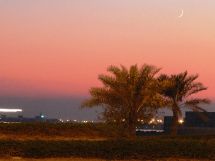
| |
| A crescent moon can be seen over palm trees at Manama, marking the beginning of the Islamic month of Ramadan in Bahrain. | |
| Also called | *Azerbaijani: Ramazan
|
| Observed by | Muslims |
| Type | Religious |
| Begins | At the last night of the month of Sha'ban[1] |
| Ends | At the last night of the month of Ramadan[1] |
| Date | Variable (follows the Islamic lunar calendar)[2] |
| Celebrations | Community iftars and Community prayers |
| Observances |
|
| Related to | Eid al-Fitr, Laylat al-Qadr |
Ramadan (also spelled Ramzan, Ramadhan, or Ramathan) is the ninth month of the Islamic calendar, observed by Muslims worldwide as a month of fasting (sawm), prayer, reflection, and community. A commemoration of Muhammad's first revelation, the annual observance of Ramadan is regarded as one of the Five Pillars of Islam and lasts twenty-nine to thirty days, from one sighting of the crescent moon to the next. Fasting from sunrise to sunset is fard (obligatory) for all adult Muslims in good health. Before the daily fast each day a predawn meal, referred to as Suhoor is eaten, and the fast is broken with a nightly feast called Iftar.
The spiritual rewards (thawab) of fasting are believed to be multiplied during Ramadan. Accordingly, Muslims refrain not only from food and drink, but also tobacco products, sexual relations, and sinful behavior, devoting themselves instead to salat (prayer) and recitation of the Quran. Ramadan also brings together the Muslim community, every evening for the iftar meal, and especially at the conclusion of the month with the celebration of Eid al-Fitr.
Etymology
The word Ramadan originally "the hot month," derives from the Arabic root R-M-Ḍ (ramida) (ر-م-ض) "be burnt, scorched." [3] According to numerous hadiths, Ramadan is one of the names of God in Islam (the 99 Names of Allah, Beautiful Names of Allah) and as such it is prohibited to say only "Ramadan" in reference to the calendar month, and that it is necessary to say the "month of Ramadan."
History
Ramadan is observed by Muslims worldwide as a commemoration of Muhammad's first revelation. The annual observance of sawm (fasting during Ramadan) is regarded as one of the Five Pillars of Islam and lasts twenty-nine to thirty days, from one sighting of the crescent moon to the next.[4][5]

The month of Ramadan is that in which was revealed the Quran; a guidance for mankind, and clear proofs of the guidance, and the criterion (of right and wrong). And whosoever of you is present, let him fast the month, and whosoever of you is sick or on a journey, a number of other days. Allah desires for you ease; He desires not hardship for you; and that you should complete the period, and that you should magnify Allah for having guided you, and that perhaps you may be thankful.[Quran 2:185]
Muslims hold that all scripture was revealed during Ramadan, the scrolls of Abraham, Torah, Psalms, Gospel, and Quran having been handed down on the first, sixth, twelfth, thirteenth (in some sources, eighteenth) and twenty-fourth Ramadans, respectively.[6] Muhammad is said to have received his first quranic revelation on Laylat al-Qadr, one of five odd-numbered nights that fall during the last ten days of Ramadan.[7]
Important dates
The first and last dates of Ramadan are determined by the lunar Islamic calendar.[2]
Beginning
Because Hilāl, the crescent moon, typically occurs approximately one day after the new moon, the beginning of Ramadan can be estimated with some accuracy (see chart). The opening of Ramadan can be confirmed by direct visual observation of the crescent.[4]
Night of Power
Laylat al-Qadr (Night of Power) is considered the holiest night of the year.[8] It is, in Islamic belief, the night when the first verses of the Quran were revealed to the prophet Muhammad. According to many Muslim sources, this was one of the odd-numbered nights of the last ten days of Ramadan, traditionally believed to be the twenty-third night of Ramadan.[9] Since that time, Muslims have regarded the last ten nights of Ramadan as being especially blessed. The Night of Qadr comes with blessings and mercy of God in abundance, sins are forgiven, supplications are accepted, and that the annual decree is revealed to the angels, who carry it out according to God's plan.
Eid
The holiday of Eid al-Fitr (Arabic:عيد الفطر), which marks the end of Ramadan and the beginning of Shawwal, the next lunar month, is declared after a crescent new moon has been sighted or after completion of thirty days of fasting if no sighting of the moon is possible. Also called the "Festival of Breaking the Fast," Eid al-Fitr celebrates of the return to a more natural disposition (fitra) of eating, drinking, and marital intimacy. It is forbidden to fast on the Day of Eid, and a specific prayer is nominated for this day.[10] As an obligatory act of charity, money is given to the poor and the needy before performing the Eid prayer. After the prayers, Muslims may visit their relatives, friends, and acquaintances or hold large communal celebrations in homes, community centers, or rented halls.
Religious practices
During the month of Ramadan the common practice is to fast from dawn to sunset.
Muslims also devote more time to prayer and acts of charity, striving to improve their self-discipline.
Fasting
Ramadan is a time of spiritual reflection, self-improvement, and heightened devotion and worship. Muslims are expected to put more effort into following the teachings of Islam. The fast (sawm) begins at dawn and ends at sunset. The act of fasting is said to redirect the heart away from worldly activities, its purpose being to cleanse the soul by freeing it from harmful impurities. Ramadan is an opportunity to practice self-discipline, self-control,[11] sacrifice, and empathy for those who are less fortunate, thus encouraging actions of generosity and compulsory charity (zakat).[12]
Exemptions to fasting include travel, menstruation, severe illness, pregnancy, and breastfeeding. Muslims with medical conditions are recommended not to fast, although those unable to fast due to travel of temporary sickness are obligated make up the missed days later.[13]
Suhoor
Each day before dawn, Muslims observe a pre-fast meal called the suhoor ("pre-dawn meal"). Sahur is regarded by Islamic traditions as a benefit of the blessings in that it allows the person fasting to avoid the crankiness or weakness caused by the fast. According to a hadith in Sahih al-Bukhari, Anas ibn Malik narrated, "The Prophet said, 'take sahur as there is a blessing in it.'"[14]
After the meal, and still before dawn, Muslims begin the first prayer of the day, Fajr.[15]
Iftar
At sunset, families break the fast with the iftar, traditionally opening the meal by eating dates to commemorate Muhammad's practice of breaking the fast with three dates.[16] They then adjourn for Maghrib, the fourth of the five required daily prayers, after which the main meal is served.[17]
Social gatherings, with the food many times served in buffet style, are frequent at iftar. Traditional dishes are often highlighted. Water is usually the beverage of choice, but juice and milk are also often available, as are soft drinks and caffeinated beverages.[18]
In the Middle East, iftar consists of water, juices, dates, salads, and appetizers; one or more main dishes; and rich desserts, with dessert considered the most important aspect of the meal.[19] Typical main dishes include lamb stewed with wheat berries, lamb kebabs with grilled vegetables, and roasted chicken served with chickpea-studded rice pilaf. Desserts may include luqaimat, baklava, or kunafeh.[20]
Over time, the practice of iftar has involved into banquets that may accommodate hundreds or even thousands of diners. The Sheikh Zayed Grand Mosque in Abu Dhabi, the largest mosque in the UAE, feeds up to thirty thousand people every night.[21] Some twelve thousand people attend iftar every night at the Imam Reza shrine in Mashhad.[22]
Nightly prayers
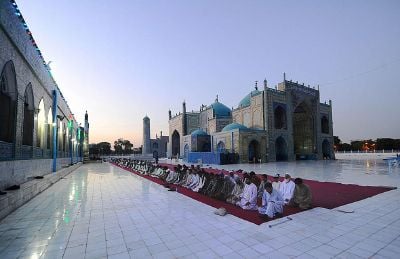
Tarawih (Arabic: تراويح) literally "rest and relaxation," are extra nightly prayers performed during the month of Ramadan. It may involve reading one Juz' (Arabic: جُزْء, or section of the Quran. Unlike the five daily salat ritual prayers which are fard (obligatory) under Islamic law, tarawih prayers are considered optional (sunnah “habitual practice”).[23]
Recitation of the Quran
Muslims are encouraged to read the entire Quran, which comprises thirty juz' (sections), over the thirty days of Ramadan. Some Muslims incorporate a recitation of one juz' into each of the thirty tarawih sessions observed during the month.[24]
Zakat al-Fitr
Zakat al-Fitr or Sadaqat al-Fitr is a charitable obligation, mandatory for all Muslims — male or female, minor or adult as long as they have the means to do so — that is traditionally paid before the end of Ramadan.[25] The collected amount is used to pay the zakat collectors and to the poor so that they may be provided with a means to celebrate Eid al-Fitr (the festival of breaking the fast) following Ramadan.
Zakat al-Fitr, the special contribution during Ramadan, is a fixed amount assessed per person, while Zakat, or Zakat al-mal ("zakat on wealth"), one of the Five Pillars of Islam, zakat is a religious duty for all Muslims, is based on personal income and property.
Cultural practices
In some Islamic countries, lights are strung up in public squares and across city streets, a tradition believed to have originated during the Fatimid Caliphate, where the rule of Caliph al-Mu'izz li-Din Allah was acclaimed by people holding lanterns.[26]
In Indonesia, the iftar meal is announced every evening by striking the bedug, a giant drum, in the mosque. The bedug is also part of the Eid al-Fitr celebrations at the end of Ramadan. Starting on the evening of the last day of Ramadan and continuing throughout the night and into the following day, the bedug are beaten for the Takbiran prayers and during parades and celebrations of Eid al-Fitr.[27] On the island of Java, many believers bathe in holy springs to prepare for fasting, a ritual known as Padusan.[28] In the Chinese-influenced capital city of Jakarta, firecrackers are widely used to celebrate Ramadan, although they are officially illegal.[29] Certain kinds of food are especially popular during Ramadan, such as large beef or buffalo in Aceh and snails in Central Java.[30]
During Ramadan in countries in the Middle East, such as Egypt, Syria, Sudan, Saudi Arabia, Jordan, Pakistan, and Palestine, a Mesaharati beats a drum to wake people up to eat the suhoor meal and dawn prayer.[31] Similarly, in Indonesia and nearby countries in Southeast Asia, a slit drum known as a kentongan is used to wake households up for the pre-dawn meal.
|
Observance
Fasting from sunrise to sunset is fard (obligatory) for all adult Muslims who are not acutely or chronically ill, traveling, elderly, pregnant, breastfeeding, diabetic, or menstruating. A predawn meal, suhoor, and nightly feast, iftar, that breaks the fast, are part of the schedule of fasting. There is widespread observance, with the majority (over 90 percent) of Muslims reporting that they fast during Ramadan.[32]
The spiritual rewards (thawab) of fasting are believed to be multiplied during Ramadan. Accordingly, Muslims refrain not only from food and drink, but also tobacco products, sexual relations, and sinful behavior,[33] devoting themselves instead to salat (prayer), recitation of the Quran, and the performance of charitable deeds.
Ramadan in polar regions
The length of the dawn to sunset time varies in different parts of the world according to summer or winter solstices of the Sun. Most Muslims fast for eleven to sixteen hours during Ramadan. However, in polar regions, the period between dawn and sunset may exceed twenty-two hours in summer. For example, in 2014, Muslims in Reykjavik, Iceland, and Trondheim, Norway, fasted almost twenty-two hours, while Muslims in Sydney, Australia, fasted for only about eleven hours. In areas characterized by continuous night or day, some Muslims follow the fasting schedule observed in the nearest city that experiences sunrise and sunset, while others follow Mecca time.[34]
Ramadan in Earth orbit
Muslim astronauts in space schedule religious practices around the time zone of their last location on Earth. For example, an astronaut from Malaysia launching from the Kennedy Space Center in Florida would align their fast according to sunrise and sunset in Eastern Standard Time. This includes times for daily prayers, as well as sunset and sunrise for Ramadan.[35] Astronauts may also delay their Ramadan observance until they return to earth, if this is more practical.
Employment during Ramadan
Muslims continue to work during Ramadan; however, in some Islamic countries, such as Oman, Lebanon, Bahrain, and Kuwait, working hours may be shortened. It is often recommended that working Muslims inform their employers if they are fasting, given the potential for the observance to impact performance at work.[36] The extent to which Ramadan observers are protected by religious accommodation varies by country. Policies putting them at a disadvantage compared to other employees have been met with discrimination claims.[37]
Health
Ramadan fasting is safe for healthy people, but those with medical conditions are advised to seek medical advice if they encounter health problems before or during fasting.
Ramadan fasting can be potentially hazardous for pregnant women as it is associated with risks of inducing labor and causing gestational diabetes. It is permissible to not fast if it threatens the life of the woman or the child.
Notes
- ↑ 1.0 1.1 Malcolm Clark, Islam For Dummies (John Wiley & Sons, 2019, ISBN 978-1119642978).
- ↑ 2.0 2.1 Ramadan 2022 Calendar Date. Retrieved May 3, 2022.
- ↑ Ramadan Etymology Online. Retrieved May 3, 2022.
- ↑ 4.0 4.1 AbdAllah-Muhammad Bukhari-Ibn-Ismail, Sahih Bukhari – Book 031 (The Book of Fasting), Hadith 124 Hadith Collection. Retrieved May 3, 2022.
- ↑ Abul-Hussain Muslim-Ibn-Habaj, Sahih Muslim – Book 006 (The Book of Fasting), Hadith 2378 Hadith Collection. Retrieved May 3, 2022.
- ↑ Rafig Y. Aliyev, Loud Thoughts on Religion (Trafford Publishing, 2013, ISBN 978-1490705217).
- ↑ Mahmood Bin Ahmad Ad-Dausaree, The Magnificence of Quran (Darussalam Publishers, 2015, ISBN 978-9960980119).
- ↑ Neal Robinson, Islam: A Concise Introduction (Georgetown University Press, 1999, ISBN 978-0878402243).
- ↑ Bombay Tract and Book Society, Life of Mohammed (Wentworth Press, 2019, ISBN 978-0353880443).
- ↑ Deborah Heiligman, Holidays Around the World: Celebrate Ramadan and Eid al-Fitr with Praying, Fasting, and Charity (National Geographic Children's Books, 2006, ISBN 978-0792259268).
- ↑ Adam Yosef, Why Ramadan brings us together BBC, August 25, 2009. Retrieved May 2, 20203, 2022.
- ↑ Thomas Erdbrink, Help for the Heavy at Ramadan Washington Post, September 28, 2008. Retrieved May 3, 2022.
- ↑ Quran 2:184
- ↑ Bukhari: Book 3: Vol. 31: Hadith 146 (Fasting).
- ↑ Abul-Hussain Muslim-Ibn-Habaj, Sahih Muslim – Book 006 (The Book of Fasting), Hadith 2415 Hadith Collection. Retrieved May 3, 2022.
- ↑ John L. Esposito, The Oxford dictionary of Islam (Oxford University Press, 2004, ISBN 978-0195125597).
- ↑ Melissa Fletcher Stoeltje, Muslims fast and feast as Ramadan begins San Antonio Express-News, August 22, 2009. Retrieved May 3, 2022.
- ↑ Nour El-Zibdeh, Understanding Muslim Fasting Practices Today's Dietitian, 11(8) (August 2009): 56. Retrieved May 3, 2022.
- ↑ Darra Goldstein (ed.), The Oxford Companion to Sugar and Sweets (Oxford University Press, 2015, ISBN 978-0199313396).
- ↑ Faye and Yakir Levy, Ramadan's high note is often a dip Los Angeles Times, July 21, 2012. Retrieved May 3, 2022.
- ↑ Abu Dhabi's Grand Mosque feeds 30,000 during Ramadan Euro News, May 10, 2019. Retrieved May 3, 2022.
- ↑ Gisoo Misha Ahmadi, Iran's Mashhad hosts biggest "Iftar" in world Iran Mirror, June 15, 2016. Retrieved May 3, 2022.
- ↑ Shaykh Furhan Zubairi, Guidance For Praying Tarawih At Home Muslim Matters. Retrieved May 3, 2022.
- ↑ Huda, All About Ramadan, Islam's Holy Month Learn Religions, April 8, 2021. Retrieved May 3, 2022.
- ↑ Sadaqat-ul-Fitr Hidaya Foundation. Retrieved May 3, 2022.
- ↑ Noura Anwar, Two Cultural Symbols of Ramadan: Lantern and Qatayef Arab America, June 7, 2017. Retrieved May 3, 2022.
- ↑ Ramadan and Lebaran in Indonesia Living in Indonesia, November 7, 2019. Retrieved May 3, 2022.
- ↑ This Is How Indonesia Welcomes Ramadan Jakarta Globe, May 4, 2019. Retrieved May 3, 2022.
- ↑ Calvin Sims, Jakarta Journal; It's Ramadan. School Is Out. Quick, the Earplugs! The New York Times, December 19, 2000. Retrieved May 3, 2022.
- ↑ Agus Maryono and Severianus Endi, On the hunt for delectable snacks The Jakarta Post, July 7, 2014. Retrieved May 3, 2022.
- ↑ Jihad Abaza, Meet Cairo’s mesaharati: The spirit of Ramadan beats to a woman’s drums Middle East Eye, June 11, 2018. Retrieved May 3, 2022.
- ↑ Fatima Ghani, Most Muslims say they fast during Ramadan Pew Research Center, July 9, 2013. Retrieved May 3, 2022.
- ↑ Ed Hotaling, Islam Without Illusions: Its Past, Its Present, and Its Challenge for the Future (Syracuse University Press, 2003, ISBN 0815607660).
- ↑ Ashifa Kassam, Arctic Ramadan: fasting in land of midnight sun comes with a challenge The Guardian, July 3, 2016. Retrieved May 3, 2022.
- ↑ Rachel Donadio, Interstellar Ramadan The New York Times Magazine, December 9, 2007. Retrieved May 3, 2022.
- ↑ Saiyyidah Zaidi, The Working Muslim in Ramadan Working Muslim, 2011. Retrieved May 3, 2022.
- ↑ Brett Snider, Reasonable Accommodations for Ramadan? Lessons From 2 EEOC Cases FindLaw, June 27, 2014. Retrieved May 3, 2022.
ReferencesISBN links support NWE through referral fees
- Ad-Dausaree, Mahmood Bin Ahmad. The Magnificence of Quran. Darussalam Publishers, 2015. ISBN 978-9960980119
- Aliyev, Rafig Y. Loud Thoughts on Religion: A Version of the System Study of Religion. Useful Lessons for Everybody. Trafford Publishing, 2013. ISBN 978-1490705217
- Bombay Tract and Book Society. Life of Mohammed. Wentworth Press, 2019. ISBN 978-0353880443)
- Clark, Malcolm. Islam For Dummies. John Wiley & Sons, 2019. ISBN 978-1119642978
- Esposito, John L. The Oxford dictionary of Islam. Oxford University Press, 2004. ISBN 978-0195125597
- Heiligman, Deborah. Holidays Around the World: Celebrate Ramadan and Eid al-Fitr with Praying, Fasting, and Charity. National Geographic Children's Books, 2006. ISBN 978-0792259268
- Hotaling, Ed. Islam Without Illusions: Its Past, Its Present, and Its Challenge for the Future. Syracuse University Press, 2003. ISBN 0815607660
- Robinson, Neal. Islam: A Concise Introduction. Georgetown University Press, 1999. ISBN 978-0878402243
External links
All links retrieved December 7, 2022.
- Guide to Ramadhan
- Celebrate Ramadan
- Ramadan Information Sheet
- Ramadan The Practice of Fasting
- What is Eid and when is it?
Credits
New World Encyclopedia writers and editors rewrote and completed the Wikipedia article in accordance with New World Encyclopedia standards. This article abides by terms of the Creative Commons CC-by-sa 3.0 License (CC-by-sa), which may be used and disseminated with proper attribution. Credit is due under the terms of this license that can reference both the New World Encyclopedia contributors and the selfless volunteer contributors of the Wikimedia Foundation. To cite this article click here for a list of acceptable citing formats.The history of earlier contributions by wikipedians is accessible to researchers here:
The history of this article since it was imported to New World Encyclopedia:
Note: Some restrictions may apply to use of individual images which are separately licensed.
